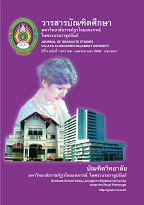ปัจจัยที่มีอิทธิพลต่อกิจกรรมการเรียนรู้ทางวิชาชีพ และความยึดมั่นผูกพันในงานผ่านสุขภาวะทางจิตวิญญาณของครูในกลุ่มสาระการเรียนรู้ โรงเรียนมัธยมศึกษาในกรุงเทพมหานคร
Main Article Content
Abstract
บทคัดย่อ
การวิจัยครั้งนี้มีจุดมุ่งหมายเพื่อ 1) ทดสอบแบบจำลองความสัมพันธ์เชิงสาเหตุของกิจกรรมการเรียนรู้ทางวิชาชีพ และความยึดมั่นผูกพันในงานที่มีสุขภาวะทางจิตวิญญาณเป็นตัวแปรคั่นกลาง 2) ศึกษาความไม่แปรเปลี่ยนของแบบจำลองความสัมพันธ์เชิงสาเหตุของกิจกรรมการเรียนรู้ทางวิชาชีพ และความยึดมั่นผูกพันในงานระหว่างครูและหัวหน้ากลุ่มสาระการเรียนรู้ กลุ่มตัวอย่างในงานวิจัยนี้ คือ ครูและหัวหน้ากลุ่มสาระการเรียนรู้ที่ปฏิบัติงานในโรงเรียนมัธยมศึกษา สังกัดสำนักงานเขตพื้นที่การศึกษาขั้นพื้นฐานกรุงเทพมหานคร ที่มาจากกลุ่มสาระการเรียนรู้ภาษาไทย สังคมศึกษา ศาสนา และวัฒนธรรม การงานอาชีพและเทคโนโลยี จำนวนทั้งหมด 726 คน แบ่งเป็นครู จำนวน 626 คน และหัวหน้ากลุ่มสาระการเรียนรู้ จำนวน 140 คน ใช้วิธีการสุ่มแบบหลายขั้นตอน เก็บข้อมูลโดยใช้แบบสอบถามจำนวน 7 แบบวัด ผลการวิจัย พบว่า 1) แบบจำลองมีความสอดคล้องกับข้อมูลเชิงประจักษ์ (2 = 404.42, df = 125 (p= .00), SRMR = 0.036, RMSEA = 0.060, GFI = 0.93, NFI = 0.98, CFI = 0.99, NNFI = 0.98, PNFI = 0.80) ผลการทดสอบเส้นทางอิทธิพลพบว่า การเปลี่ยนแปลงการปฏิบัติงาน การเรียนรู้และทดลองกระทำ และความยึดมั่นผูกพันในงานได้รับอิทธิพลทางบวกโดยตรงจากสุขภาวะทางจิตวิญญาณ และได้รับอิทธิพลทางอ้อมจากการดำรงชีวิตในเชิงจิตภายในและทุนทางจิตวิทยาเชิงบวกผ่านตัวแปรสุขภาวะทางจิตวิญญาณ ส่วนการมีแบบอย่างทางจิตวิญญาณไม่มีอิทธิทางบวกโดยตรงต่อสุขภาวะทางจิตวิญญาณ 2) ผลการศึกษาความไม่แปรเปลี่ยนของแบบจำลองระหว่างครูและหัวหน้ากลุ่มสาระการเรียนรู้ พบว่า ไม่มีความแปรเปลี่ยนของแบบจำลองความสัมพันธ์เชิงสาเหตุของกิจกรรมการเรียนรู้ทางวิชาชีพ และความยึดมั่นผูกพันในงานระหว่างครูและหัวหน้ากลุ่มสาระการเรียนรู้
ABSTRACT
The purpose of this study was to test the causal relationship model of professional learning activity and work engagement through spiritual well-being of secondary school teachers in the learning area in Bangkok, and 2) to examine the invariance of the structural relationship models of the effect of professional learning activity and work engagement though spiritual well-being between teachers and head teachers in the learning area. The sample consisted of 766 teachers from Thai Language Learning Area, Social Studies, Religion and Culture Learning Area and Occupations and Technology Learning Studies, including 626 teachers and 140 head teachers, randomly selected by multi-stage sampling. 7 questionnaires were used to collect data. The results revealed that 1) The developed model fitted the empirical data (2 = 404.42, df = 125 (p= .00), SRMR = 0.036, RMSEA = 0.060, GFI = 0.93, NFI = 0.98, CFI = 0.99, NNFI = 0.98, PNFI = 0.80). The study signified that the changed practice, learning and experimentation and work engagement having positive and direct effects were spiritual well-being and spiritual well-being played as mediating variable of the indirect effects from inner life and psychological capital. For spiritual modeling does not having a positive and the direct effects were spiritual well-being. 2) Examining the invariance of the structural relationship models of the effect of professional learning activity and work engagement though spiritual well-being between teachers and head teachers in the learning area showed that the model does not have the difference between groups.
Article Details

This work is licensed under a Creative Commons Attribution-NonCommercial-NoDerivatives 4.0 International License.
บทความทุกเรื่องได้รับการตรวจความถูกต้องทางวิชาการโดยผู้ทรงคุณวุฒิ ทรรศนะและข้อคิดเห็นในบทความ Journal of Global of Perspectives in Humanities and Social Sciences (J-GPHSS) มิใช่เป็นทรรศนะและความคิดของผู้จัดทำจึงมิใช่ความรับผิดชอบของบัณฑิตวิทยาลัย มหาวิทยาลัยราชภัฏวไลยอลงกรณ์ ในพระบรมราชูปถัมภ์ กองบรรณาธิการไม่สงวนสิทธิ์การคัดลอก แต่ให้อ้างอิงแหล่งที่มา


